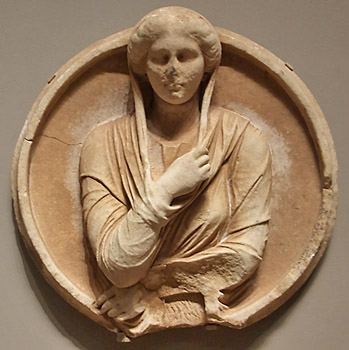
Noblewoman, funerary tondo, 2nd century CE

The young materfamilias Anicia survives only through this six-line epitaph written upon her death by Ausonius (c. 310-393 CE), professor of rhetoric, poet and statesman. Her name indicates that she was a member of the noble gens Anicia which produced political leaders during the imperial period and was perhaps descended from the plebeian Anicii who rose to prominence in Rome at the end of the 4th century BCE. She was probably a fellow-citizen of Ausonius' in Burdigala (Bordeaux, France), the capital of the Roman province of Aquitania and a prosperous commercial city at this time. A number of women bearing the name Anicia in the 4th century CE are known because of their family and marital connections with prominent men; one of these women was a poet, Anicia Faltonia Proba. Ausonius's Latin poems document the people, particularly women like Anicia who are otherwise unknown, and the mores of middle class society of his time in Gaul. There is both sadness and consolation in this memorial to Anicia's life: it is at once anonymous and universal, the expectation of any Roman matrona, except in its brevity. The poem is a variation on the theme of early death, for it celebrates the fullness of Anicia's existence. The last two lines of this nenia (a dirge to be sung at a funeral) in dactylic hexameter are a tribute to her brief, respectable life, lost perhaps in childbirth.
Omnia quae longo vitae cupiuntur in aevo
ante quater plenum consumpsit Anicia lustrum.
Infans lactavit, pubes et virgo adolevit,
nupsit, concepit, peperit, iam mater obivit.
Click on the underlined words for translation aids and commentary, which will appear in a small window.